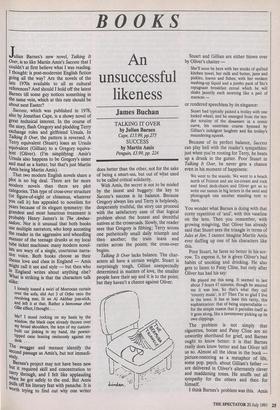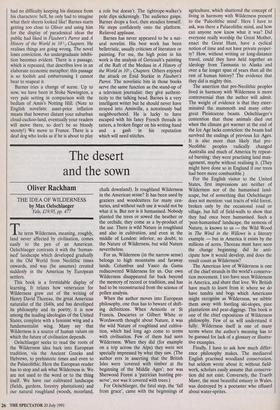BOOKS
An unsuccessful likeness
James Buchan
Julian Barnes's new novel, Talking It Over, is so like Martin Amis's Success that I couldn't at first believe what I was reading. I thought: is post-modernist English fiction going all the way? Are the novels of the late 1970s available to all as cultural references? And should I hold off the latest Barnes till some guy notices something in the same vein, which at this rate should be about next Easter?
Success, which was published in 1978, also by Jonathan Cape, is a showy novel of great technical interest. In the course of the story, flash Gregory and plodding Terry exchange roles and girlfriend Ursula. In Talking It Over, the pattern is reversed. A Terry equivalent (Stuart) loses an Ursula equivalent (Gillian) to a Gregory equiva- lent (Oliver). (I'm simplifying: Amis's Ursula also happens to be Gregory's sister and mad as a hatter, but that's just Martin Amis being Martin Amis). That two modern English novels share a plot is no big deal. There are far more modern novels than there are plot categories. This type of cross-over structure (or figure-of-eight or chiasmus, whatever you call it) has appealed to novelists for years because of its elegant symmetry: the grandest and most luxurious treatment is Probably Henry James's in The Ambas- sadors. Nor is it unusual that both books use multiple narrators, who keep accosting the reader in the aggressive and wheedling manner of the teenage drunks at my local tube ticket machines: many modern novel- ists are wary of a single, courteous narra- tive voice. Both books choose as their theme love and class in England — Amis might call it sex and style — but then who in England writes about anything else?
What is striking is that the characters talk alike:
I loosely tossed a swirl of Morrocan curtain over the sofa, slid Act 3 of Orfeo onto the revolving mat, lit an Al Akhbar joss-stick, and left it at that. Rather a bienvenue chez 011ie effect, I thought . . .
Me? I stood rocking on my heels by the window, the black cape already thrown over my broad shoulders, the keys of my custom- built car jinking in my hand, the pewter- tipped cane leaning ominously against my desk ... The swagger and menace identify the
second passage as Amis's, but not immedi- ately.
, Barnes's project may not have been new but it required skill and concentration to Carry through, and I felt like applauding When he got safely to the end. But Amis Pulls off his literary feat with panache. It is worth trying to find out why one writer does better than the other, not for the sake of being a smart-ass, but out of what used to be called critical solidarity.
With Amis, the secret is not to be misled by the incest and buggery: the key to Success's success is its balance. Because Gregory always lies and Terry is helplessly, desperately truthful, the story can proceed with the satisfactory ease of that logical problem about the honest and deceitful natives at the crossroads. Slowly, the reader sees that Gregory is fibbing; Terry scores one pathetically small daily triumph and then another; the train leans and rattles across the points; the cross-over begins. Talking It Over lacks balance. The char- acters all have a certain weight. Stuart is surprisingly tough, Gillian unexpectedly determined in matters of love, the smaller people have their say and it is to the point; but they haven't a chance against Oliver.
Stuart and Gillian are either blown over by Oliver's chatter - She'll soon be here with her stocks of quilted kitchen towel, her milk and butter, jams and pickles, loaves and fishes; with her verdant washing-up liquid and a jumbo pack of Stu's repugnant breakfast cereal which he will shake jauntily each morning like a pair of maracas — or rendered speechless by its elegance:
Stuart had typically picked a trolley with one locked wheel, and he emerged from the ten- der scrutiny of the domaniers in a comic curve, his uncertain course hymned by Gillian's indulgent laughter and his trolley's maundering squeak.
Because of its perfect balance, Success can play hell with the reader's sympathies: just when you're rooting for Terry, he beats up a drunk in the gutter. Poor Stuart in Talking It Over, he never gets a chance even in his moment of happiness:
We went to the seaside. We went to a bcach north of Frinton and ate ice-cream and rock and hired deck-chairs and Oliver got us to write our names in big letters in the sand and photograph one another standing next to them.
You wonder what Barnes is doing with that corny repetition of sand', with this vaseline on the lens. Then you remember, with growing misgiving, that Oliver has already said that Stuart sees the triangle in terms of Jules et Jim. I cannot imagine Martin Amis ever duffing up one of his characters like this.
Poor Stuart, he fares no better in his sor- row. To express it, he is given Oliver's bad habits of smoking and drinking. He also gets to listen to Patsy Cline, but only after Oliver has had his say: He played me this song. It seemed to last about 3 hours 47 minutes, though he assured me it was less. So that's what they call 'country music', is it? Then I'm so glad I live in the town. It has at least this rarity, this sophistication: that of being unparodiable for the simple reason that it parodies itself as it goes along, like a lawnmower picking up its own clippings.
The problem is not simply that cigarettes, booze and Patsy Cline are an unworthy shorthand for grief, and Barnes ought to know better: it is that Barnes really does know better and has Oliver tell us so. Almost all the ideas in the book picture-restoring as a metaphor of life, some pop. psych. about Gillian's father are delivered in Oliver's alternately clever and maddening tones. He snuffs out all sympathy for the others and then for himself.
I think Barnes's problem was this. Amis had no difficulty keeping his distance from his characters: hell, he only had to imagine what their sheets looked like! Barnes starts getting too close to Oliver and using him for the display of paradoxical ideas the public had liked in Flaubert's Parrot and A History of the World in 10112 Chapters. He realises things are going wrong. The novel loses conviction. An undergraduate inhibi- tion becomes evident. There is a passage, which is repeated, that describes love in an elaborate economic metaphor: this passage is so foolish and embarrassing I cannot bear to reapeat it.
Barnes tries a change of scene. Up to now, we have been in Stoke Newington, a very pale setting in comparison with the bedlam of Amis's Notting Hill. (Note to English novelists: asset-price inflation means that however distant your suburban cloud-cuckoo-land, eventually your readers will move there, so don't be so bloody snooty!) We move to France. There is a deaf dog who looks as if he is about to play a role but doesn't. The tightrope-walker's pole dips sickeningly. The audience gasps. Barnes drops a foot, then steadies himself. He steps confidently onto the platform. Relieved applause.
Barnes has never appeared to be a nat- ural novelist. His best work has been belletristic, usually criticism of literature or painting. For me, the high point in his work is the analysis of Gericault's painting of the Raft of the Medusa in A History of the World in 10112 Chapters. Others enjoyed the attack on Enid Starkie in Flaubert's Parrot, The novelistic bits in those books serve the same function as the stand-up of a television journalist: they give authent- ticity to the talking head. Barnes is a very intelligent writer but he should never have strayed into Amisville, a notoriously bad neighbourhood. He is lucky to have escaped with his fancy French threads in tatters, a broken finger on his writing hand and a gash in his reputation which will need stitches.



















































 Previous page
Previous page